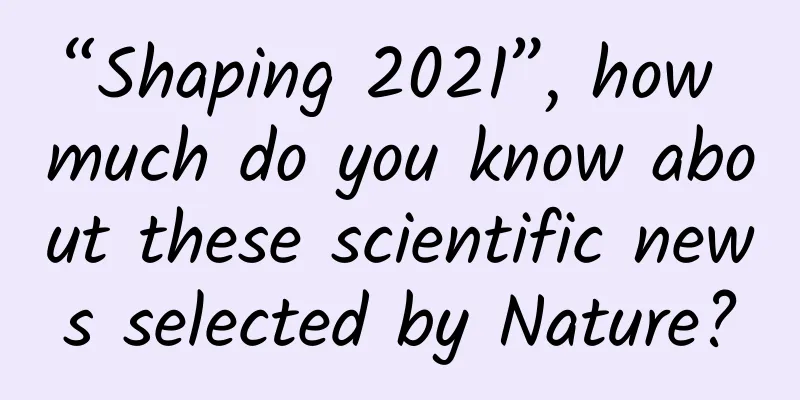“Shaping 2021”, how much do you know about these scientific news selected by Nature?

|
On the 14th local time, the news editor of the website of the British magazine Nature selected "Science News that Shaped 2021". Here are some excerpts. From the continued spread of the epidemic to the "Mars Exploration" trips of various countries, from the approval of Alzheimer's disease drugs to the game of Glasgow Climate Change Conference, how many "decisive moments" have occurred in the field of science and research this year? How much do you know? New coronavirus variants reduce vaccine protection The pandemic has been with us for another full year, as researchers raced to learn more about the coronavirus variants. COVID-19 vaccines are largely protective against variants Alpha, Beta, and Gamma, but then Delta emerged. In March, the Delta variant began sweeping India at an alarming rate. In a country where the vaccination campaign has not yet made much progress, the Delta variant has caused a steady increase in deaths and hospitalizations. From there, it spread around the world, bringing more severe outbreaks and lockdowns. Data continue to show that vaccines generally protect people infected with the Delta variant from the worst consequences of COVID-19, but that they are less protective against Delta than other variants. In late November, the latest "variant of concern," Omicron, emerged. Early data suggest that it severely undermines vaccine immunity, but booster shots improve the situation. Doctors in South Africa say the number of confirmed cases has surged due to the new Omicron variant of the coronavirus. Image source: Nature website Mars exploration staged "Romance of the Three Kingdoms" NASA's Perseverance rover landed on the red planet on February 18, ushering in a new era of Martian exploration. After landing, Perseverance deployed a small helicopter and completed the first powered flight on Mars. In September, Perseverance successfully collected the first rock sample that can be brought back to Earth, which will help scientists analyze signs of life on Mars. On May 15, China's Zhurong rover successfully landed on Mars. It collected a large amount of geological data from a previously unexplored area. In February, the UAE sent the Hope rover into Mars orbit and eventually took photos of the Martian "Aurora". A rocket-powered "sky crane" took this photo as NASA's Perseverance rover landed on the surface of Mars in February. Image source: Nature website Abnormal muons may open the door to a revolution in physics On April 7, researchers at Fermilab's Muon g-2 experiment reported that muons—giant, unstable, electron-like particles—are more magnetic than originally predicted. Decades ago, an earlier version of the experiment hinted that muons behaved in ways that didn't match the Standard Model's theoretical predictions. Researchers are now scrutinizing this year's calculations. If they hold up, and the discrepancy between theory and experiment persists, it could mark a failure of the predictions of the 50-year-old Standard Model of particle physics. The Fermilab Muon Anomalous Magnetic Moment Experiment (Muon g-2) used this storage ring magnet. Image source: Nature website FDA approves first Alzheimer's drug amid controversy On June 7, local time, the U.S. Food and Drug Administration (FDA) approved the first new drug to treat Alzheimer's disease in 18 years. This excited people affected by the disease, but also angered some researchers. The developer of the drug, Biogen, a biotechnology company based in Cambridge, Massachusetts, said that this antibody drug can clear clumps of beta-amyloid protein in the brain. Some scientists believe that beta-amyloid protein is the root cause of Alzheimer's disease. But the drug "has uncertainty in clinical benefit." Although an advisory panel strongly recommended that the FDA not approve the drug, the FDA did so, and this move led to the resignation of the advisors. Subsequently, the U.S. federal government investigated the decision. Clearing amyloid plaques from the brain is one of the goals of Alzheimer's disease treatment. Image source: Nature website CRISPR gene editing therapy proves effective in humans for the first time Since its inception, the gene editing technology CRISPR has been touted as a "game changer" for treating diseases. However, to make the dream a reality, researchers need to successfully implant CRISPR-Cas9 into the human body and prove that it only safely and effectively edits its target genes. On June 26, the clinical trial results released by Intellia Pharmaceuticals (NTLA) and Regeneron in the United States proved this. Scientists tested their treatment on six patients with a rare disease called transthyretin amyloidosis, which causes abnormal accumulation of a misfolded protein in human organs and tissues. The results showed that the levels of deformed proteins decreased in all participants, and the protein levels of two people who received high-dose injections decreased by an average of 87%. The CRISPR-Cas9 complex (white and blue) can cut DNA (green) and disable genes that cause disease. Image source: Nature website DeepMind AlphaFold can predict a large number of protein structures In July, DeepMind, a world-renowned artificial intelligence team, announced that they had used an artificial intelligence (AI) system to predict the structure of almost all proteins expressed by humans, as well as almost the entire proteome of 20 other organisms. The algorithm, called AlphaFold, was successful in 2020, predicting the structure of proteins more accurately than ever before. Researchers say that more than 350,000 protein structures released in 2021 have the potential to revolutionize life sciences, holding the secrets of disease and becoming targets for drugs. "This is the biggest contribution that an AI system has made to the advancement of scientific knowledge so far," DeepMind co-founder and CEO Demis Hassabis told Nature magazine. Machine learning tools such as AlphaFold can predict the 3D structure of proteins. This figure depicts the human interleukin-12 protein bound to its receptor. Image source: Nature website Should we get a booster shot? This is the question we face during the epidemic As some countries began to seriously consider giving a third booster shot to people who have been fully vaccinated with two doses of the vaccine in the middle of this year, researchers also began to question whether this measure was necessary. There is evidence that vaccine immunity is waning in the face of the highly contagious Delta variant of the new coronavirus, but vaccination still provides some protection overall. And with the emergence of the latest variant, Omicron, real-world data from Israel and elsewhere show that booster shots reduce people's risk of contracting COVID-19. Many public health researchers urge more adults to get booster shots. But they point out that when only 7% of people in low-income countries have received a single dose of the vaccine, mutations will continue to evolve in infected people. They support intellectual property exemptions and other mechanisms to increase the global supply of vaccines so that there is no need to trade off between booster shots and fairness. A health worker goes door to door to vaccinate people in the rural area of Jerusalem, Colombia. Image source: Nature website IPCC climate report warns countries that extreme weather may continue In its first comprehensive assessment of climate science since 2013, the United Nations Intergovernmental Panel on Climate Change (IPCC) painted a grim and clear picture for the health of the planet: If governments do not take action to curb greenhouse gas emissions, the record droughts, wildfires and floods that are already causing damage around the world will only get worse. According to the report, the Earth has already warmed 1.1°C compared to the average level between 1850 and 1900, and at current emissions levels, it is likely to exceed 1.5°C within 10 years. If global warming reaches 2°C, it will break the temperature control goals of the Paris Agreement, and extreme temperature events that previously occurred only once every 50 years will occur every few years, increasing the likelihood of death and destruction. At the same time, this latest study adds to a growing number of climate attribution studies: researchers directly linked the record-breaking heat wave in the Pacific Northwest of North America and the unprecedented floods in Germany this year to human-caused climate change. In a world that rises 2°C above pre-industrial levels, glaciers and sea ice are at risk. Image source: Nature website Seeking consensus amid differences, the Glasgow Climate Pact was reached at COP26 At the 26th United Nations Climate Change Conference (COP26), politicians announced new commitments to limit greenhouse gas emissions, agreeing on further cuts. The Glasgow Climate Pact, signed by 197 parties (196 countries plus the European Union), calls for a 45% reduction in global CO2 emissions by 2030 compared to 2010 levels. In the early stages of the summit, world leaders attending made major commitments to end deforestation, reduce methane emissions and phase out coal-fired power generation. Overall, however, researchers say that if fully implemented, these commitments will still lead to a world temperature increase of 2.4°C above pre-industrial levels, and many question whether governments will rise to the challenges ahead. World leaders including European Commission President Ursula von der Leyen, US President Joe Biden and British Prime Minister Boris Johnson at a meeting during COP26. Image source: Nature website ◎ Zhang Jiaxin, intern reporter of Science and Technology Daily Source: Science and Technology Daily Editor: Zhang Qiqi Review: Yue Liang Final review: Liu Haiying |
<<: From childhood to adulthood, how many things have your parents done to hurt you?
>>: Technology News | A large amount of water was discovered in the Mariner Valley on Mars
Recommend
QQ is openly building its defenses while Alipay is secretly making moves. Who will win in this year's red envelope battle?
Will the three-year Spring Festival red envelope ...
Douyin City Store Visiting Number 0-1-10-0 Complete Thoughts Review
Douyin local store exploration account complete i...
What is everything made of? This question led to the most successful scientific theory in history!
If we could divide an apple, or anything around y...
The little secret about "vegetable oil" that merchants won't tell you!
The production of most foods must comply with nat...
How to improve the voice of B-side designers? Let’s see the analysis of the director of a large company!
The current situation of lack of voice Let’s get ...
What are the differences between the SEO of Baidu, Sogou, 360, and Shenma search engines?
For these commonly used search engines in China, ...
What is the market price for a bottle of 52-degree platinum cellar-aged wine (Kweichow Moutai Distillery)?
How much is the market price of a bottle of 52-de...
Scientists create world's thinnest noodles, smaller than the wavelength of light!
Author: Shi Xiangqi and Li Chuanfu At University ...
The number of epidemic risk areas continues to increase! Here's how to find the nearest "epidemic community"
As of 0:00 on January 3, 2021, the number of medi...
How to make an idea for app promotion?
The Internet population dividend has disappeared,...
Keyword marketing setup tips
For products, without effective exposure, they wi...
Meizu Pro 7 review: It’s more like an Apple Watch integrated into a smartphone
Meizu, which hadn't held a press conference f...
Insights | Let go when it’s time to let go and learn to look forward
Famous Artists Gallery | Xie Zhiliu, a native of ...
AppStore has a loophole and user privacy has been leaked on a large scale
A vulnerability appeared in the AppStore, causing...
WeChat JS-SDK Description-Open Interface Description
Basic interface Determine whether the current cli...









